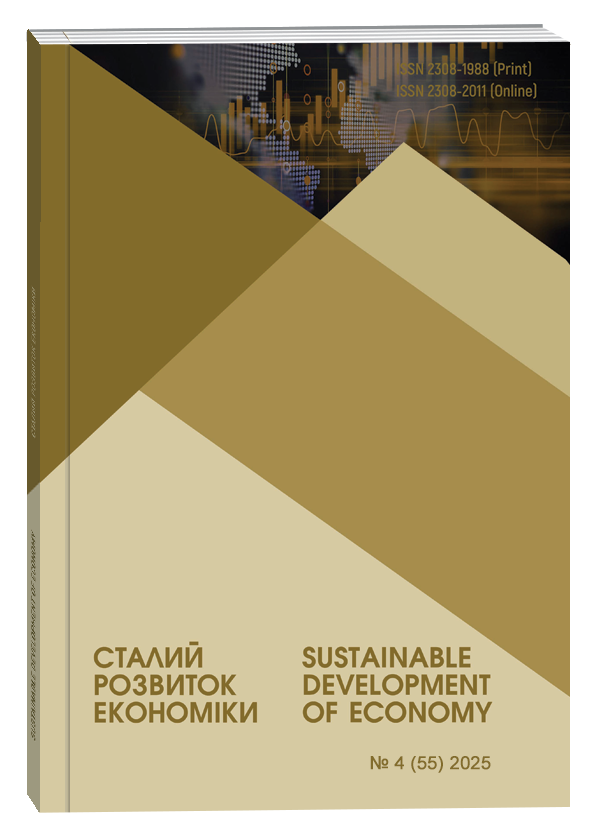MONETARY POLICY AS A CATALYST FOR INNOVATIVE DEVELOPMENT OF ENTERPRISES UNDER CONDITIONS OF UNCERTAINTY
Abstract
The article examines the role of monetary policy as a key instrument of macroeconomic regulation that shapes the financial environment for innovative development of enterprises under conditions of uncertainty. The relevance of the study is determined by the growing global instability caused by military conflicts, energy shocks, and financial turbulence, which requires new approaches to ensuring sustainable economic growth. Theoretical foundations of the research are based on Keynesian, monetarist, and neo-institutional paradigms, which consider monetary instruments as factors influencing investment activity, accumulation of human and physical capital, and innovation performance. J. Tobin emphasized the impact of monetary policy on the cost of capital and investment decisions, while N. Gregory Mankiw, D. Romer, and D. Weil demonstrated the link between monetary policy, savings, and human capital formation. D. North, representing the neo-institutional approach, underlined the role of institutional quality and transaction costs in determining the effectiveness of monetary and innovation policies. In Ukraine, the full-scale war has sharply worsened financial conditions and access to credit for enterprises. The National Bank of Ukraine (NBU) raised its key policy rate from 9% to 25% in 2022 (+1600 basis points) to stabilize the economy, which coincided with an 18% fall in R&D expenditures. The following stabilization of the rate at 25% in 2023 led to partial recovery (+24.7%), and the reduction of the rate to 15.5% in 2024 (−950 basis points) corresponded to a 31.6% growth of innovation financing. This confirms a clear inverse relationship between the NBU’s monetary tightening and enterprises’ innovation spending. The proportion of innovation-active industrial firms dropped to 8.8% in 2023 but recovered to 15.7% in 2024, driven mainly by defense, energy, and digital sectors. The study argues that while high interest rates are necessary for macroeconomic stabilization, they simultaneously restrain technological renewal and limit firms’ ability to invest in innovation. Therefore, post-war recovery in Ukraine requires combining monetary stability with pro-innovation incentives.
References
Tobin, J. Money, capital, and other stores of value. The American Economic Review. 1961. Vol. 51. No. 2. pp. 26-37. URL: https://cooperative-individualism.org/tobin-james_money-capital-and-other-stores-of-value-1961-may.pdf
Mankiw, N. G., Romer, D., & Weil, D. N. A Contribution to the Empirics of Economic Growth. The Quarterly Journal of Economics. 1992. Vol. 107. No. 2. pp. 407-437. URL: https://eml.berkeley.edu/~dromer/papers/MRW_QJE1992.pdf
North, D. C. Institutions, institutional change and economic performance. Cambridge: Cambridge University Press, 1990. URL: https://epistemh.pbworks.com/f/8.%20Institutions__Institutional_Change_and_Economic_Performance.pdf
Ma, Y., & Zimmermann, K. Monetary Policy and Innovation. NBER Working Paper. 2023. No. 31534. URL: https://www.nber.org/papers/w31698
Elfsbacka-Schmöller, M., Goldfayn-Frank, O., & Schmidt, T. Beyond the Short Run: Monetary Policy and Innovation Investment. ECB Working Paper. 2024. No. 3080. URL: https://papers.ssrn.com/sol3/papers.cfm?abstract_id=5064739
Національний банк України. Облікова ставка Національного банку. URL: https://bank.gov.ua/ua/monetary/archive-rish?utm_source=chatgpt.com
World Bank. Ukraine – Innovation and entrepreneurship ecosystem diagnostic. URL: https://documents1.worldbank.org/curated/en/126971509628933853/pdf/IBArchive-dcc99bad-a6f8-40e1-b454-ad0e63e49da8.pdf
Державне управління статистики України. Витрати на наукові дослідження і розробки за видами економічної діяльності. URL: https://ukrstat.gov.ua/operativ/operativ2021/ni/rik/v_ed_ue.xlsx
Tobin, J. (1961) Money, capital, and other stores of value. The American Economic Review. Vol. 51. No. 2. pp. 26-37. Available at: https://cooperative-individualism.org/tobin-james_money-capital-and-other-stores-of-value-1961-may.pdf
Mankiw, N. G., Romer, D., & Weil, D. N. (1992) A Contribution to the Empirics of Economic Growth. The Quarterly Journal of Economics. Vol. 107. No. 2. pp. 407-437. Available at: https://eml.berkeley.edu/~dromer/papers/MRW_QJE1992.pdf
North D. C. (1990). Institutions, institutional change and economic performance. Cambridge: Cambridge University Press, Available at: https://epistemh.pbworks.com/f/8.%20Institutions__Institutional_Change_and_Economic_Performance.pdf
Ma Y. & Zimmermann K. (2023). Monetary Policy and Innovation. NBER Working Paper. 2023. No. 31534. Available at: https://www.nber.org/papers/w31698
Elfsbacka-Schmöller M., Goldfayn-Frank O. & Schmidt T. (2024). Beyond the Short Run: Monetary Policy and Innovation Investment. ECB Working Paper. No. 3080. Available at: https://papers.ssrn.com/sol3/papers.cfm?abstract_id=5064739
Natsionalʹnyi bank Ukrayiny. Oblikova stavka Natsionalʹnoho banku [Discount Rate of the National Bank]. Available at: https://bank.gov.ua/ua/monetary/archive-rish?utm_source=chatgpt.com (in Ukrainian)
World Bank. Ukraine – Innovation and entrepreneurship ecosystem diagnostic. Available at: https://documents1.worldbank.org/curated/en/126971509628933853/pdf/IBArchive-dcc99bad-a6f8-40e1-b454-ad0e63e49da8.pdf
Derzhavne upravlinnia statystyky Ukrayiny. Vytraty na naukovi doslidzhennia i rozrobky za vydamy ekonomichnoi diialʹnosti [Expenditures on Research and Development by Type of Economic Activity]. Available at: https://ukrstat.gov.ua/operativ/operativ2021/ni/rik/v_ed_ue.xlsx (in Ukrainian)


